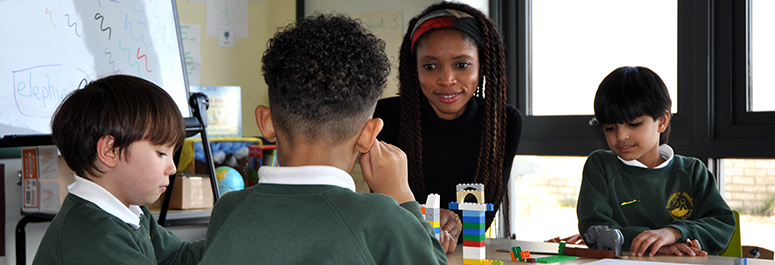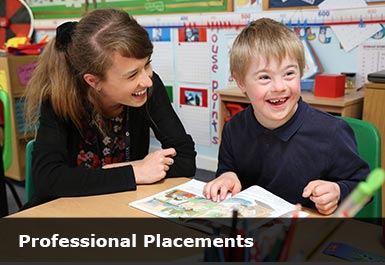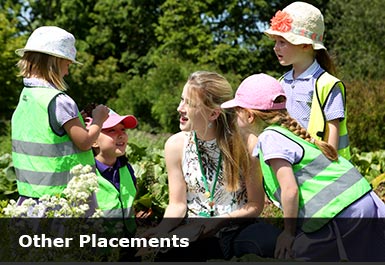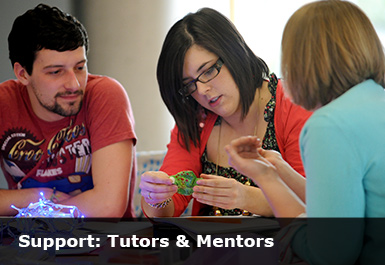
I have taught two great lessons (Maths and English) and one absolute train-wreck of a science experiment. But with a few days of distance, I can now see what important lessons I learned from it - lessons that I probably wouldn't have truly taken on board any other way.
Partnership schools
All PGCE students spend at least 120 days of the course in Partnership schools, undertaking four key placements (in a minimum of three different schools), in order to develop their teaching skills in a closely monitored environment, and to gain experience of many of the important tasks and responsibilities teachers take on outside the classroom.
Summary
- 120 days (at least) in Partnership schools
- Four key placements
- Three different schools (minimum)
Additional settings
In addition, PGCE students will experience at least 5 further settings, which include schools with identified specialisms, centres of excellence and schools with specialist SEN provision. There is also an opportunity for some PGCE students to undertake a museum education placement.
Listen to Cambridge PGCE students discussing their experiences of school placements
A variety of contrasting environments
Partnership schools reflect a variety of contrasting environments: rural village schools, inner city schools in Peterborough and Cambridge and urban schools in towns such as Harlow, Stevenage, Ely, Huntingdon, Bury St Edmunds and March.
Daily travelling distance
No PGCE student is placed in a school which is beyond daily travelling distance, and those who live at distance are, where possible, placed in Partnership schools nearer to their homes. For the final placement a few PGCE students have the opportunity to work in London.

Block Placements
'Our current PGCE students have settled in superbly and are a lovely, positive pair to have in school.'
During the first term, PGCE students spend two two-week placements working in a class with a student partner. This pairing provides peer support and allows for collaborative working. PGCE students work with small groups of children and will teach some whole class sessions.
An eight week placement takes place across Terms 1 and Term 2 and is spent working with the same student partner in a different age phase. During this placement, PGCE students progress from teaching individual lessons to teaching whole days.
The final ten week placement, taking place at the end of Term 2 and throughout Term 3, provides the opportunity for PGCE students, working in a class on their own with their mentor, to gain further classroom experience and to confirm that they have reached the required level for the award of Qualified Teacher Status. There is also opportunity for involvement in a wider range of school activities and extending the experience and education of pupils beyond the conventional classroom context.

Other Placements
In the final placement, all PGCE students spend a full week exploring aspects of SEND. This includes three days based in a Special school environment.
[SEN Focus Week] 'I was really apprehensive at first as I didn't know what to expect but it has been such a wonderful experience and I've loved it - definitely the best week of the year. I feel like I've learnt so much in such a short amount of time.'
PGCE students also spend a week focusing on the ‘Wider Curriculum’ in their final placement. This involves exploring curriculum and extra-curricular provision, learning about unique aspects of a school's provision and developing understanding of wider aspects of the teacher’s role.
[Wider Curriculum week] 'I just wanted to let you know we are having a fantastic week. We had a day going through all the functions on the iPad and this afternoon we were making movies in iMovie and writing up lessons in book creator. I am totally converted to iPad teaching! The school have put so much thought and effort into our experience.’

Support in School
'Mentors facilitate the pathway into the teaching profession as they allow you to see the role of the teacher from the inside out'.
Mentors have experience of working with PGCE students and many are former students themselves; they have in-depth knowledge and understanding of the requirements and demands of the Cambridge PGCE.
PGCE students have regular meetings with their mentor before and throughout every placement. Mentors support PGCE students in all aspects of teaching and learning and will help them to reflect on and analyse their practice through constructive dialogue and target setting. Mentors observe PGCE students teach, give feedback on lessons and offer encouragement and advice. Faculty tutors also visit PGCE students in each placement to observe teaching, offer support and monitor progress.
